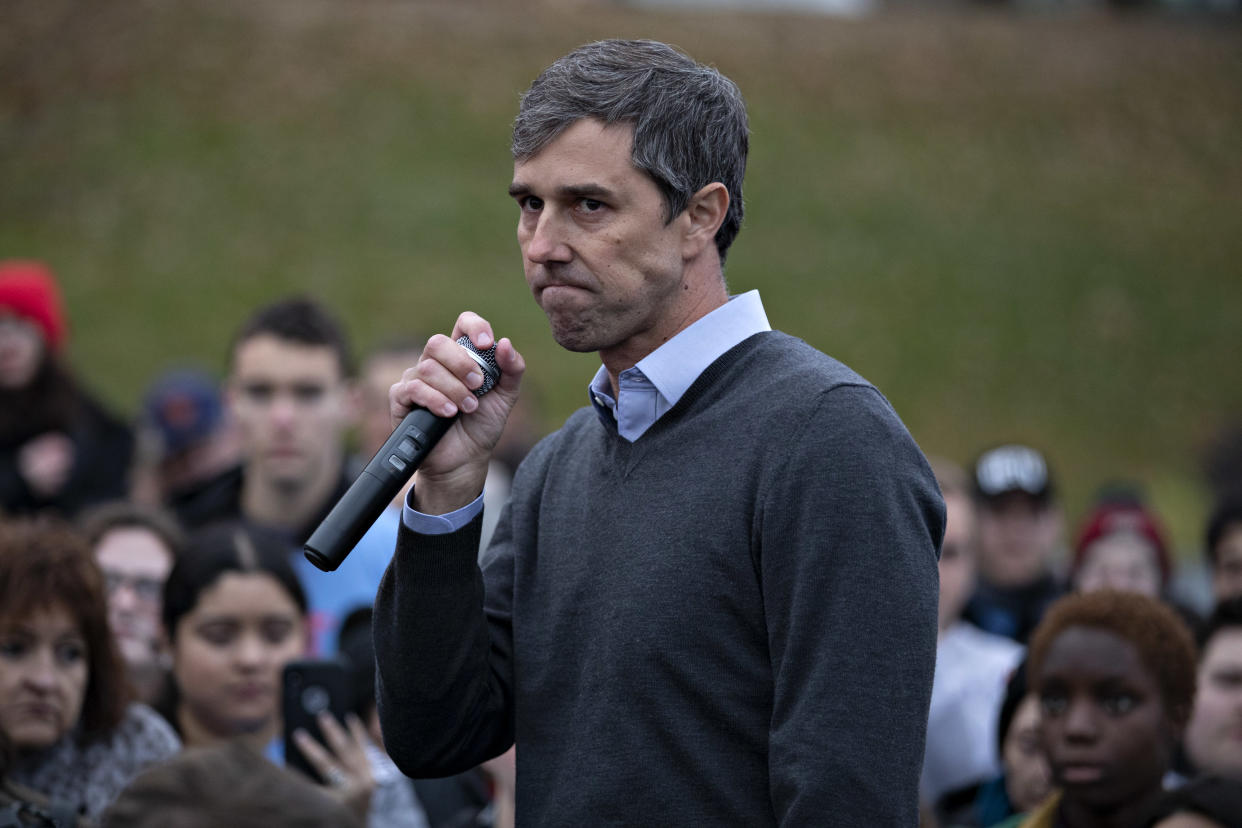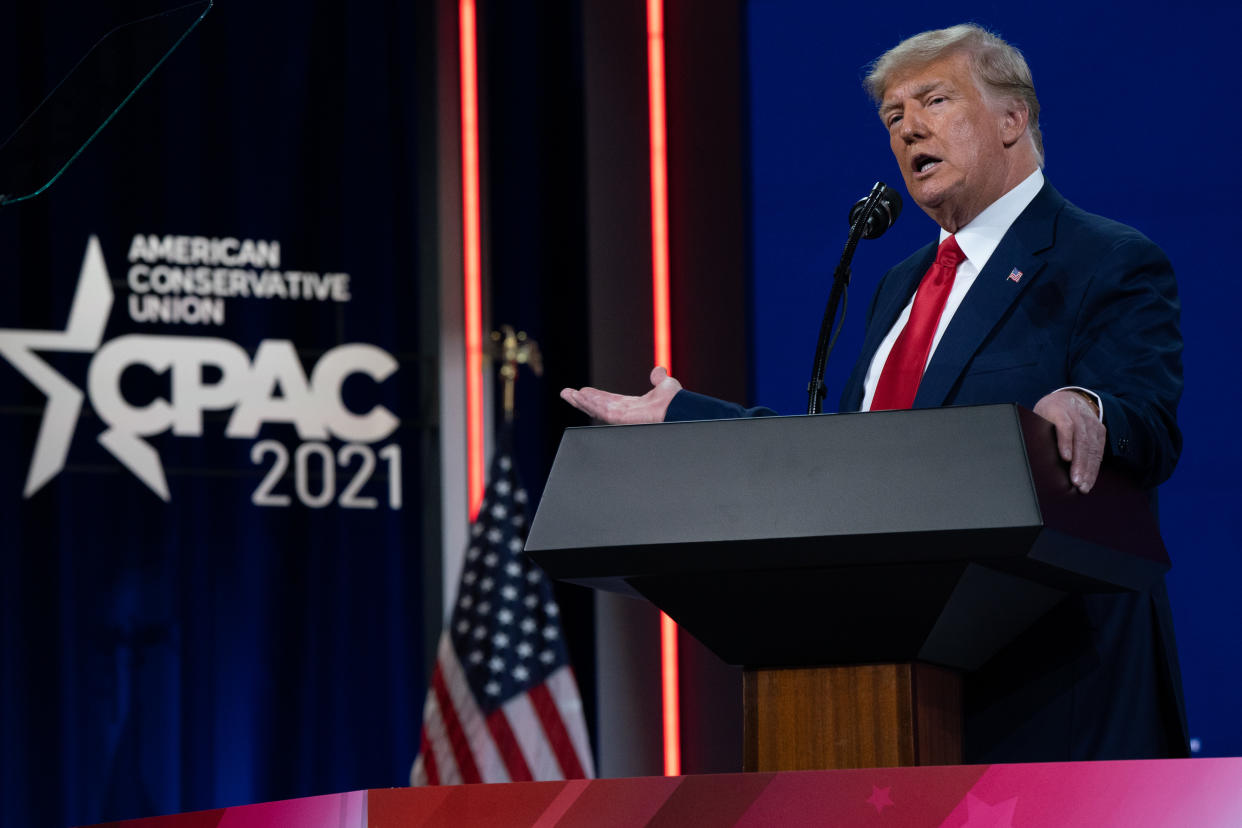As in Georgia, Texas Democrats look to mobilize businesses against voting restrictions
With new voting restrictions making their way through the Texas legislature, Democrats in the state are seeking to replicate the pressure campaign waged by activists and businesses in Georgia to stop the measures from becoming law.
On Tuesday, a coalition of activists and politicians called on major corporations with a presence in Texas to stop making political contributions to any state lawmakers who have supported Senate Bill 7, which would limit early voting hours, eliminate drive-through voting centers and roll back an expansion of mail-in voting that was allowed in 2020 because of the coronavirus pandemic.
“Texas is already the hardest state in the country to vote in,” said Sarah Labowitz, policy director with the American Civil Liberties Union of Texas. The bill, which has been introduced in the Texas legislature, would also criminalize any attempt to help people fill out or deliver their mail-in ballot, she said.

Other speakers on the call, including former Rep. Beto O’Rourke, D-Texas, and former Housing and Urban Development Secretary Julián Castro, accused Republicans of trying to reinstate Jim Crow-type restrictions on voting reminiscent of the post-Reconstruction era, in which African-Americans were systemically and violently excluded from casting ballots.
Georgia Democrats waged a similar campaign aimed at corporations, drawing on a long history of racialized voter suppression in that state to accuse the GOP of trying to move the state and the nation backward with its latest voting bill. In response, several major corporations based in Georgia, such as Delta Air Lines and Coca-Cola, issued statements publicly opposing the legislation. And Major League Baseball shocked the country by relocating its All-Star Game from Atlanta to Denver.
In Texas, American Airlines, which is based in Fort Worth, said last week that it is “strongly opposed to this bill and others like it.” And the CEO of Dell Technologies, Michael Dell, tweeted that “free, fair, equitable access to voting is the foundation of American democracy.”
“Those rights — especially for women, communities of color — have been hard-earned. Governments should ensure citizens have their voices heard,” Dell said in a statement. He added that the Texas bill “does the opposite, and we are opposed to it.”
O’Rourke and Castro and others thanked American Airlines and Dell for their comments, and called on them to stop making financial contributions to politicians who vote for the bill. “We need the strong words to be matched by strong actions,” said Cliff Albright, co-founder of Black Voters Matter.
O’Rourke mentioned other big companies with a presence in Texas, such as Pepsi, Frito-Lay and AT&T, and called on consumers to contact the companies and demand they oppose the Texas legislation.
Republicans, meanwhile, have reacted with anger toward the businesses who have spoken out. Texas Gov. Greg Abbott had planned to throw out the first pitch at the Texas Rangers’ home opener on Monday, but then backed out in retaliation for MLB’s decision to move the All-Star game. Texas Lt. Gov. Dan Patrick said that “Texans are fed up with corporations that don’t share our values trying to dictate public policy.”

Senate Minority Leader Mitch McConnell, R-Ky., has weighed in on the issue as well. “My warning, if you will, to corporate America is to stay out of politics. It’s not what you’re designed for. And don’t be intimidated by the left into taking up causes that put you right in the middle of America’s greatest political debates,” McConnell said Tuesday. He added: “I’m not talking about political contributions.”
McConnell has been one of the fiercest defenders in American politics of the right of corporations to make financial contributions to politicians without disclosure, and “Citizens United,” the 2010 Supreme Court decision that made such contributions legal, characterized political donations as a form of speech.
During a Tuesday press conference, Patrick singled out Harris County for criticism. Harris includes the city of Houston and is the third most populous county in the entire nation. It’s also a Democratic stronghold and it was the place where county officials implemented drive-through voting and 24-hour voting centers in part to allow voters to cast ballots safely in the middle of the pandemic.
The Democrats on the Tuesday call said they hope to stop the Texas bill from passing into law, and lamented that the Georgia legislation passed. However, there was backlash to the Georgia voting bill before it passed into law that resulted in some of the worst provisions being eliminated. The Georgia bill still makes it harder to vote by mail, reduces the number of drop boxes, and makes it a crime for volunteers to hand out water or food to anyone standing in line to vote, but it also expands early voting and includes provisions intended to eliminate long lines for voting.
It also gives the state legislature more control over the State Election Board and potentially over county boards of elections. “That may be one of the most pernicious parts of the bill,” said Rick Hasen, a voting law expert at the University of California-Irvine, on the Dan Abrams podcast.
Much of the outrage over the Georgia legislation was in reaction to an attempt in an earlier version of the bill that would have eliminated early voting on Sundays, when Black churches often organize parishioners to go to vote after worship services in what has become known as “Souls to the Polls.” And that was all in the context of a push by Republicans in legislatures around the country to roll back voting access, with a raft of bills proposed by lawmakers who claimed that the measures were needed to combat voter fraud.
This anti-fraud push was a result in large part of the lies told by former President Trump in 2020 about cheating and a rigged election. And Trump’s false claims were the capstone of nearly 20 years of unsuccessful Republican efforts to find evidence of systematic or widespread voter fraud to justify placing certain obstacles in the way of voting, such as restricting early voting or implementing voter ID in what appeared to be a partisan manner.

For example, in Texas, the Republican legislature in 2013 passed a law to require voter ID at the polls but then only allowed certain types of ID in a way that favored voters in conservative-leaning demographics. The Texas law stated the concealed carry licenses could be used to vote, but that student ID’s could not, for instance. Gun ownership is often a reliable indicator of conservative political views, while younger voters tend to vote more Democratic.
Some conservatives have pushed back against the GOP’s attempts to make it harder to vote.
“Republicans are in a bad place, because I think they find themselves arguing, in essence, that there ought to be fewer voters, which is, in my view, wrong, and also the wrong place to be as a political matter,” Yuval Levin, the director of social, cultural and constitutional studies at the American Enterprise Institute, told Yahoo News. “It’s not good for the party to think that way. It should think, 'How do we win more votes in a more diverse society?' rather than, 'How do we let fewer people vote in a more diverse society?'”
But Levin is also concerned about overheated rhetoric that reduces faith in American elections.
“Republicans are at risk, and more than risk, of confirming the Democratic caricature that Republicans just don't want people to vote because they're afraid they would lose. That's what it sounds like. And, increasingly, that's what it is. And that's dangerous, and wrong,” Levin said. “I think Democrats are at risk of confirming the caricature that they think about election reform in a cynical partisan way, as a means of enabling themselves to win more elections.”
“What’s most needed now is greater public confidence in our elections,” he said. “This has to be bi-partisan. It just has to. And both parties need to see that. And right now, neither one does.”
Thumbnail cover photo: Megan Varner/Getty Images
____
Read more from Yahoo News:
